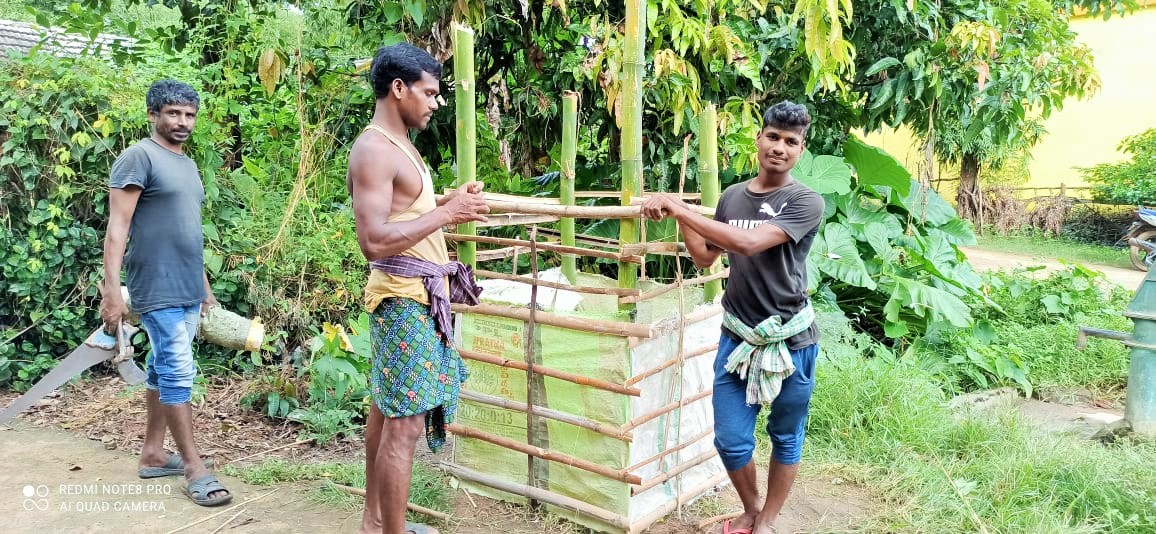Local Solutions contributing to global problems
StoryBy Sangita Patra
1 July 2021
Children are taking small steps in their own villages to address the issue of solid waste. Child committees are enforcing a ban of single use plastics and polythene, and installing dustbins for garbage dump.

Handmade dustbins set up at different corners of the Pentadihi village by the youths.
Photograph by Sabitri Ojha
The construction of toilets and bathing rooms helps in ending the practice of open defecation once and for all. However, management of daily waste continues to be a bottleneck towards achieving total sanitation. The village communities need to realise the second generation issues relating to water, sanitation, and hygiene and trigger the demand for solutions. Solid waste in the rural context is either bio-degradable or non-biodegradable. While the biodegradable waste is mostly managed as compost, it is the non-biodegradable waste that pose a challenge in rural areas which includes both recyclable and non-recyclable waste. It is important that communities learn to identify biodegradable and non-biodegradable waste, segregate it, and set up mechanisms for disposal of the same to achieve a clean environment.
In many of our operational villages, it is heartening to see that children are on a mission to safeguard the environment and community health. Child Committees have been formed where children are actively involved in keeping their villages clean and safe.
In Maligaon and Digribandh villages, in Kalahandi district of Odisha, members of the committee organised awareness drives on the harmful effects of plastic and polythene, made dustbins and handmade garbage dump with sticks fencing the dump for their villages. This ensures that plastic bags, biscuit wrappers, sachets etc. do not move around in the village and are safely contained in one place for further disposal. Children regularly monitor adherence to safe waste disposal practices.
Saindri Naik, a Village Development Committee member, says with pride, “A year ago, the roads in Digribandh were littered with garbage and polythene bags. This attracted flies, and the polythene bags choked our drains. Most importantly, our cattle used to swallow polythene bags along with the leftover food materials which used to cause choking. Now our village has become clean and comparatively safer for our cattle, thanks to the efforts of the children. It feels better to walk around the village without polythene bags of various colours strewn around.”
The child committees in Maligaon are determined to make their village polythene free and when they meet in the monthly meetings, they make plans on making their village waste free and clean. The children are trying to mobilise discontinuing use of single-use plastics at their family level.
Similarly, a bunch of spirited youth from Pentadihi village, Keonjhar district came together to make their village environment clean. They took help from the Village Development Committee and organised an awareness meeting for their village. They decided to make garbage dumping bins with locally available materials. Bamboo stems were collected locally and cut and erected to create the dustbin structure and recyclable cement bags were used as covering for the fencing. Five such bins were set up at different corners of the village. These hand-made bins were inaugurated on the occasion of Gandhi Jayanti on October 02, 2020 by the Village Development Committee and families were advised strictly to put their plastic and polythene waste there.
Handmade garbage dump made by children of Maligaon.
Photograph by Sanjaya Baral
ACKNOWLEDGEMENT
Santosh Kumar Rout, Sanjaya Baral, and Sabitri Ojha helped in writing this story. Ganesh Chakravarthi edited the story.
ABOUT THE AUTHOR
Sangita Patra is the Thematic Manager for Documentation and Communications at Gram Vikas.
RELATED BLOGPOSTS
Turning losses into gains: How Mallipanka farmers find success in new crops
Reviving agriculture: Mallipanka’s first strawberry farm story.
Ensuring dignity beyond life: supporting migrant families in their darkest hours
Gram Vikas ensures safe migration and dignified repatriation for deceased migrant workers, supporting bereaved families.
Collective leadership transforms ageing overhead water tank to secure household water supply for all
Kalakhadi’s aging overhead tank revived through collective leadership, ensuring sustainable water supply for the community.